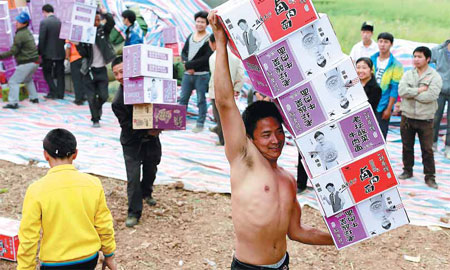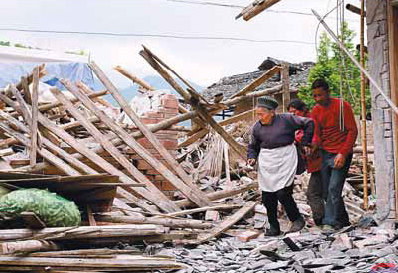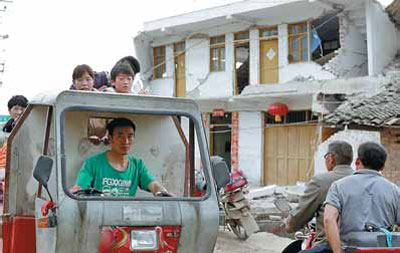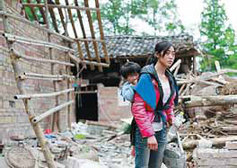Isolation smashed as rescuers build lifeline
Updated: 2013-04-23 08:10
By Hu Yongqi in Ya'an, Sichuan, and He Na, Jiang Xueqing in Beijing (China Daily)
|
||||||||
|
Supplies of instant noodles arrive at Wuxing village in Lushan county. Photos by Feng Yongbin / China Daily |
|
Villagers survey the remains of their houses in Wuxing. |
|
Wuxing residents start a cleanup operation before any rescue teams arrive. |
|
Hu Xia, 29, and her 2-year-old daughter at their destroyed house in Wuxing. |
After two days of waiting in desperation, residents of Wuxing, a village just 2 km from Lushan county seat, the epicenter of Saturday's earthquake in Sichuan province, finally saw their first glimmer of hope.
The villagers, whose homes sustained extensive damage in the quake, received their first shipment of aid - huge quantities of water and instant noodles - on Monday afternoon. More supplies are set to arrive in the days to come.
The quake, which razed 90 percent of the houses in the village of 5,890 residents, left three people dead.
"I guess it may be attributable to the lack of media coverage, but our village has received very little attention so far. We badly need food, water and tents," said Hu Xia.
"There are many infants in the village, and they are going without baby formula. We have to feed them rice soup instead. Some of the older kids cry all day long because they are so hungry. How can little kids live on just noodles?" asked the 29-year-old mother of two young daughters. She called for urgent deliveries of rice and other food the children will find more palatable.
Despite their gratitude, many villagers said the aid provided so far is simply not enough to stave off the hunger and cold. Some expressed a mixture of discontent and understanding.
"Except for a few ambulances, very little attention has been paid to the village after the quake. We thought we had been forgotten. What's disappointed us most is that two days have passed, but the members of our village committee haven't even shown up yet," said another resident, villager Wang Dingbang.
"We can only depend on ourselves. We rescued some items from collapsing houses and constructed several makeshift shelters. But, of course, we understand that resources are limited because there are just so many victims. As long as people don't forget about us, things will be fine," said the 71 year old.
The electricity and water supplies were cut off by the quake, according to Wang, so villagers have been collecting water from an abandoned well. "The water is a little muddy, but it has helped us during these two days. The makeshift shelters we've erected are not waterproof at all. We need more tents, please," he said.
Buildings destroyed
The high mountains and deep valleys that dominate the local landscape are breathtakingly beautiful, but their sheer scale has hampered relief efforts and provided plenty of headaches for rescue workers as they struggle to reach isolated communities
However, Wuxing is not the only village in these forbidding mountains where residents have been forced to wait for aid to arrive in the wake of the magnitude-7 quake. Qinglongchang, Gucheng, and Qinglong are still in desperate need of relief supplies.
In Qinglongchang, one of the places hit hardest in Longmen town, almost every house has been damaged to some degree. It's estimated that more than 80 percent of them are now uninhabitable.
The only sealed road linking the village with the outside world has been destroyed, buried beneath collapsed houses. Villagers have managed to clear some parts of the road, but only to the extent that motorbikes or bicycles can use it. Cars and trucks will have to wait.
The village has 1,000 residents, scattered across 300 households. Luckily for them, most were working in the fields when the quake struck and despite the collapsed buildings, no deaths were reported in the village although around a dozen people were injured.
Chen Tianping, 40, has been sharing a shelter with 50 other people. Resources are scarce, and so five or six people huddle together beneath each blanket. Chen said she is unable to sleep at nights, not only because of the continuing aftershocks and the crying of the children, but also because she is deeply worried about the future.
The mother of two teenage students said her husband's leg was injured by falling masonry and the things she, and the other villagers, want most are food, water and a safe place to live.
"Most of the houses in the village were two-story buildings. We always stored our food on the top floor, partly to keep it away from rats, but also to allow corn to dry thoroughly. When the house started to shake, we were so scared. We rushed outside without thinking to collect any food or other belongings," said Chen.
Her house was one of few in the village with three stories. After the quake it was reduced to just two. The aftershocks come almost every hour, and no one dares to enter the unstable buildings to search for food.
The village head and local Party secretary in Qinglongchang travel to the center of Longmen town every day to collect bottled water and instant noodles. Each villager is rationed to two half-liter bottles of water and one cup of instant noodles a day, far from sufficient to meet the demand.
Mutual help
"As the saying goes, 'Misfortune tests the sincerity of friends'. We villagers are all helping each other right now. We constructed a simple, temporary stove on some flat ground and put all the grains and water in a large pan to cook porridge. We have also been boiling water for the elderly people and kids to drink," said Chen.
"About 10 relief workers in military uniform came to our village after the quake. We really want to thank them because they helped treat the injured. Later, a number of volunteers arrived, carrying water and food. They stayed for a couple of hours to help, she added.
"We have heard that a lot of relief workers have now arrived in the town. People say they have brought supplies as well. I hope they have enough to give some to us, because the food we have will only last one more day," she said.
Meanwhile, Yang Baixiu, 55, said her house was so badly damaged that even the strong metal door was buckled.
"We have more than 50 kilograms of rice at home, but unfortunately it's all on the top floor. The food we have is only enough for tomorrow's lunch, but maybe there are people worse off than us, and the rescue workers thought it better to help them? We just hope that, after they save those people, they will remember us. Most of the people in the village are children, women and the elderly. We can't get to the center of town to collect water and food. Please help us," she begged.
The villagers used broken doors and boards to construct a huge platform that acts as a bed for many residents.
The rescue workers also provided a large tent, the only proper one in the village. Its size means many villagers can huddle inside. The other inhabitants make do with hastily erected shelters, made out of bricks, wood and plastic sheeting, according to Yang.
"Nearly 50 people crowded into the tent to sleep, but many more have been sleeping outside. It often rains in Ya'an. Please help us by sending more tents. It would be terrible if the children and elderly residents got sick," she said.
Focus of distribution
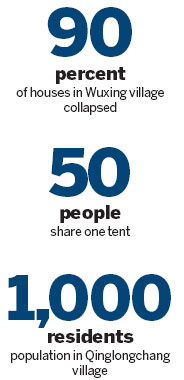
"To avoid having all the supplies go to one place, the organizers of the disaster relief efforts will send groups of rescuers to different places to conduct a basic assessment of their requirements. The process of collecting and passing on information is crucial," said Ye Wan, a communications officer with the One Foundation, a private, charitable fundraiser.
"When we arrive at a disaster-stricken area, we ask the local government officials how much rice, oil and other supplies they need and send the details to our office in Chengdu, the provincial capital. In turn, the office will gather supplies from a range of sources and deliver them accordingly," Ye added.
As the rescue efforts entered a third day, the focus began to turn from heavily populated counties and towns to remote villages of just a few households.
Because a large number of medical staff and rescue teams have gathered at the site of the township government and places where no more residents need to be evacuated, the main thrust of the rescue effort has now been directed toward remote, inaccessible villages, said Zheng Jingchen, president of the General Hospital of the Armed Police Forces in Beijing, who traveled to the quake zone to assume a lead role at the coordination center for relief efforts in Lushan county.
"We have pledged not to leave any blind spots. Not a single person will be left behind," he said.
At 7 am on Monday, more than 100 relief workers, divided into five groups, were dispatched to Baoxing county and the towns of Longmen, Baosheng, Taiping and Shuangshi. Their first task was to talk to local officials, discover which villages have yet to receive help from the rescue teams and then trek to them to search for survivors.
"Today (Monday) is the last day of the '72 golden hours' (the period in which relief efforts have optimum impact). If we find any survivors, they are likely to be in a critical condition. So we have made good preparations and are carrying portable defibrillators and surgical equipment," said Zheng.
Yang Renyi, president of the No 37 Hospital of the People's Liberation Army in Ya'an, led more than 30 medics on a trek from Lushan to the county town of Baoxing on Sunday. The 40-km journey took nearly 12 hours.
Having treated 59 patients at the county hospital and a further 100 at a nearby stadium that served as a transit center for victims, the relief workers moved on to a series of villages and households across the county.
"In Baoxing, the villages are dispersed over a wide area, but the county has a small population, less than 60,000 people," said Yang Renyi. "In some places, the road is clear for vehicle use, but in other places it's still blocked. Frequent landslides are hampering the rescue workers as they try to recover the roads.
"It's important to make sure the traffic runs smoothly so supplies can reach these remote places," he said, adding that more medicine, food and other aid is being transported from Lushan to Baoxing.
Contact the writers at huyongqi@chinadaily.com.cn and hena@chinadaily.com.cn
Peng Yining and Wu Wencong contributed to this story.
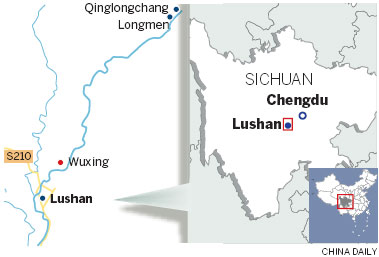
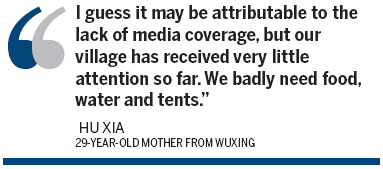
(China Daily 04/23/2013 page6)

 Obama celebrates young inventors at science fair
Obama celebrates young inventors at science fair
 Earth Day marked around the world
Earth Day marked around the world
 Volunteer team helping students find sense of normalcy
Volunteer team helping students find sense of normalcy
 Ethnic groups quick to join rescue efforts
Ethnic groups quick to join rescue efforts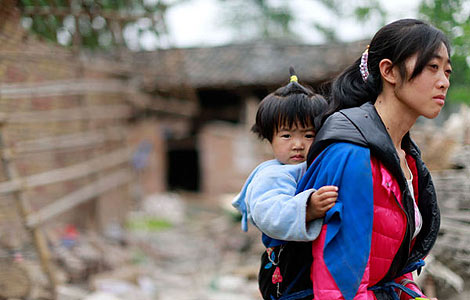
 Earthquake leaves family shattered
Earthquake leaves family shattered
 Boston Marathon bombing suspect charged
Boston Marathon bombing suspect charged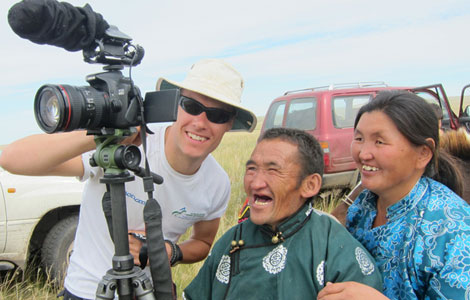
 Chasing vestiges of the Great Wall
Chasing vestiges of the Great Wall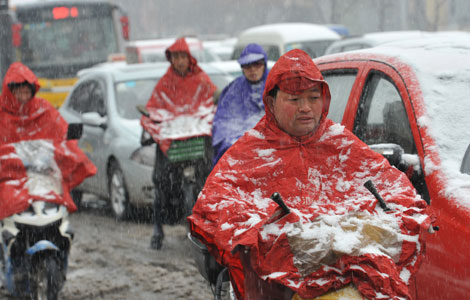
 Weekly Photos: April 15-21
Weekly Photos: April 15-21
Most Viewed
Editor's Picks

|

|

|

|

|

|
Today's Top News
Russia criticizes US reports on human rights
China 'aims to share its dream with world'
Chinese president appoints 5 new ambassadors
Nation's IPR suits see spike in 2012
H7N9 not spread between humans: WHO
Health new priority for quake zone
Sino-US shared interests emphasized
China, ROK criticize visits to shrine
US Weekly

|

|
